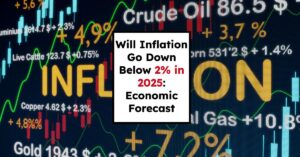Alright, let's dive right in – will inflation actually drop below that magic 2% mark in 2025? The short answer, based on what I'm seeing and hearing, is: it's highly unlikely. While we've seen some cooling off since the big price spikes of 2022, it seems like that pesky inflation is proving to be more stubborn than a toddler who doesn't want to wear their shoes.
Most experts, including the folks at the Federal Reserve, are predicting inflation will hover around 2.5% in 2025, rather than dipping below that 2% threshold. It's a bit of a bummer, I know, especially if you're like me and enjoy seeing the numbers go down at the checkout.
Will Inflation Go Down Below 2% in 2025: Economic Forecast
Now, don't get me wrong, it's not all doom and gloom. We've definitely come a long way since those crazy inflation peaks. But, there are a bunch of factors keeping prices from falling faster, like those pesky service costs and the ever-present issue of housing. It feels like when one problem starts to resolve itself, another one pops up to take its place, a bit like trying to clean your house with toddlers around – a never-ending cycle.
Let's take a closer look:
- Goods vs. Services: We’ve seen prices for physical goods mostly stabilize or even drop a bit in 2024. Think of things like electronics or clothing. However, the services side of things, like going out to eat, getting a haircut, or using public transport, well, those costs remain stubbornly high. I can definitely vouch for this when I look at my monthly expenditures.
- Housing Costs: Ah, housing – the big kahuna of expenses. It's not just about rent anymore, is it? Things like property taxes and home repairs all contribute to the upward pressure. Government data on housing tends to lag a bit behind what's actually happening in the real world, which means that these inflation numbers might actually be a bit higher than what we are seeing in the data right now.
- Tariffs and Trade Wars: Now, here's a real kicker. The idea of new tariffs, especially from a potential second Trump presidency, could really shake things up. Think about those proposed tariffs on goods coming from China and Mexico, it's like adding an extra layer of cost that businesses will likely pass on to the consumer. And it's not just a one-time price hike; there's the risk of trade disputes that disrupt supply chains, creating even more inflationary pressure. It's a bit of a global tug-of-war that could have consequences on our wallets.
Looking Closer: The Numbers Game
Okay, let's get a bit nerdy for a minute and look at some of the economic forecasts. Don't worry, I'll keep it nice and simple.
- The Fed’s Take: The Federal Reserve's preferred measure of inflation shows a significant cooling since mid-2022. However, recent months have seen a slight uptick, which is not good news. They're now projecting inflation will remain above their target of 2% in 2025. It's like they've hit a plateau and are struggling to break through that barrier.
- Economist's Predictions: Most economists agree with the Fed, generally projecting an inflation rate of about 2.5% for 2025, a figure that feels like it is stuck to a particular point. Wells Fargo, for example, is predicting 2.5% to 2.6%. That's not much different than what we saw in late 2024.
- The Congressional Budget Office (CBO): The CBO has a slightly more optimistic view, projecting 2.2% for the end of 2025. Even then, it's still over the Fed's target, so it is not that optimistic.
- The IMF's Global Outlook: Globally, the International Monetary Fund expects inflation to cool down to about 4.3% by the end of 2025, with advanced economies like the U.S. and Eurozone hopefully getting close to their 2% targets. But emerging markets are expected to have more challenges, which is not really surprising, to be honest.
Here's a quick table to make it easier to visualize:
| Source | Inflation Forecast for 2025 |
|---|---|
| Federal Reserve | Around 2.5% |
| Wells Fargo | 2.5% – 2.6% |
| Congressional Budget Office | 2.2% |
| International Monetary Fund (Global) | 4.3% |
Tariffs: The Wild Card
I have to admit that the potential impact of tariffs is what keeps me up at night, honestly. It feels like we're playing a game of economic chess with global superpowers, and we the consumers, are caught in the crossfire. If the U.S. imposes those proposed tariffs, especially on goods from China and Mexico, we're likely to see a bump in prices. Some economists even estimate that a 10% tariff could push inflation closer to the 3% range. It is important to note that these are not predictions and are just the possible risks that we could be staring at, should these tariffs get implemented.
Of course, it's not just about the initial price hike. If trading partners decide to retaliate, it could really disrupt our supply chains, making everything even more expensive and unpredictable, and that is something no consumer would want.
Regional Differences: Not Every Country is the Same
Here's another thing to keep in mind – inflation is not uniform. What we see happening in the US might be very different from what's going on in Europe, Asia, or Africa.
- Eurozone: The Eurozone is expected to get closer to the 2% target in 2025, mainly because energy prices are dropping, and supply chain issues are easing. This is a positive sign, though it is not applicable for the US.
- Asia: China's inflation is low, but there is a general economic slowdown, which I believe will cause some ripple effects. India, on the other hand, is growing at a good pace, with moderate inflation.
- Emerging Markets: Countries like Ghana are struggling with relatively high inflation, projected to be around 11.9% in 2025.
What Could Mess Up the Forecast?
As much as I try to follow all the data and reports, I know that these forecasts are just that – forecasts. A lot can change between now and 2025. It is imperative that we always keep a close eye on the markets and any related news, so that we are not caught off guard. Here are some things I'm keeping on my radar:
- Geopolitical Turmoil: Conflicts in the Middle East, trade wars, or any other global mess can really throw a wrench in things, causing price spikes in energy and other essentials.
- Labor Shortages: If the supply of workers dries up due to less immigration or other factors, it could constrain economic growth, potentially increasing inflation. I have a feeling the skilled workforce is already going to be difficult to secure in the future, with all the focus on AI and technology.
- The “Unknown Unknowns”: As Donald Rumsfeld famously said, there are things we don't know that we don't know. Unexpected events can always impact the markets. Remember how unexpected the pandemic was? Such incidents are always something that we should keep in mind and be ready for.
My Personal Take: It's a Marathon, Not a Sprint
If I'm being honest, I don't expect to see inflation magically drop below that 2% target in 2025. We're in for a period of sticky inflation, where prices may go up and down, but the overall trend of elevated prices won’t go away quickly. This means that as consumers, we'll need to be smart with our money, shop around for deals, and budget carefully. I am already doing that and I suggest that you do that as well.
It's also important not to get too caught up in the numbers. Inflation is more than just statistics, it impacts real people and our daily lives. It can affect our ability to afford necessities, save for the future, and achieve our financial goals. And that’s why understanding what’s coming, even if it’s not exactly what we were hoping for, is crucial.
In Conclusion: Patience and Vigilance
So, will inflation decline below 2% in 2025? Based on the data, forecasts, and my personal opinion – no, it is not expected to. We're more likely to see inflation hovering around 2.5%, and there are plenty of factors that could push it higher. It's a time for patience and vigilance. Keep an eye on the news, adapt your spending habits, and remember that we’re all in this together. That's my take on it all for now.
Work With Norada in 2025: Your Trusted Source for
“Turnkey Real Estate Investing”
Amidst economic uncertainties, secure your portfolio with high-quality, ready-to-rent properties offering consistent returns.
Take control of your financial future regardless of inflation trends in 2025.
Speak with our expert investment counselors (No Obligation):
(800) 611-3060
Also Read:
- Inflation Trends 2024: Are We Winning the Battle Against Rising Prices?
- Economic Outlook 2024: Inflation Rate Falls to 2.4% in September
- Inflation Drops to 3-Year Low as Fed Eyes Interest Rate Cuts
- US in Economic Crisis: Causes, Effects, and Preparedness Strategies
- How Strong is the US Economy Today in 2024?
- Economic Forecast: Will Economy See Brighter Days in 2024?
- Will the Economy Recover in 2024?
- Economic Forecast for Next 10 Years
- Economic Forecast for the Next 5 Years
- How Close Are We to Total Economic Collapse?






